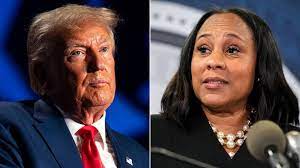Jennifer Rodgers
After each criminal indictment of former President Donald Trump, pundits have said something to the effect of “this is the worst indictment yet.” However, Trump’s fourth indictment may, in fact, pose the greatest legal risk to him – both in terms of the nature of the charges and the jurisdiction in which those charges have been brought.
On Monday, Fulton County District Attorney Fani Willis announced the fourth indictment against Trump – as well as 18 others – for alleged attempts to overturn the 2020 presidential election results in Georgia. The indictment paints an incredibly damning picture, alleging an organized attempt by the former president and his allies to undermine the fabric of American democracy – something even the most sympathetic defendant will not easily be able to fight. Trump has denied wrongdoing, as have the other defendants who have made public statements to date. The indictment is sweeping, invoking Georgia’s version of the Racketeer Influenced and Corrupt Organizations Act (RICO) and 40 other counts. Georgia’s RICO law is a vehicle by which prosecutors can charge those committing crimes with acting as part of a larger criminal enterprise – and is the most important difference from special counsel Jack Smith’s federal election interference case.
In the distant past, RICO was used primarily in mafia cases or against drug organizations, but more recently, prosecutors have used it to charge street gangs, political organizations and even more loosely aligned groups of people who organize themselves for the purpose of committing crimes. While this Georgia indictment does not provide the easy-to-read narrative that Smith gave us in the federal election interference case, the evidence here was exhaustively collected over more than two years. Willis and her team then laid it out in painstaking detail, noting which of the 19 defendants participated in the 161 charged actions under RICO.
The indictment describes eight ways in which the enterprise intended to achieve its criminal goals, including: making false statements to state legislators; making false statements to state officials; the fake electors scheme; the harassment and intimidation of election workers like Ruby Freeman and her daughter, Shaye Moss; soliciting the Justice Department to make false statements; soliciting the vice president to unlawfully reject Electoral College votes; the unlawful breach of election equipment in Coffee County; and obstruction of justice to cover up the conspiracy. In both Georgia and under federal law, RICO requires prosecutors to prove the existence of and defendants’ membership in an enterprise with criminal goals and a pattern of racketeering activity, defined by reference to a lengthy list of criminal statutes, which are called “predicate acts.” To be convicted, each defendant must participate in two or more predicate acts, and Willis has charged that all 19 defendants committed two or more of the predicate acts as listed in the first count of the indictment.
The non-RICO charges, counts two though 41, mirror the predicate acts underlying the RICO offense and include soliciting a violation of oath by a public officer, false statements and writings, impersonating a public officer, forgery, perjury and conspiracies to defraud the state and to commit election fraud. Georgia’s RICO statute differs from the federal version, however, in ways that made it applicable to the defendants’ conduct in Georgia, when it would not have been applicable in the federal system. In Georgia, the list of predicate acts that comprise racketeering activity is lengthy, and includes the offenses listed above, which were a fit for the defendants’ conduct. In the federal RICO statute, the definition of racketeering activity does not include crimes that are a good fit for the defendants’ conduct, with the exception of one: obstruction of justice.
The use of RICO carries various benefits for prosecutors, including the ability to bring in evidence that otherwise might not be admissible in terms of geographic scope and timeframe, and the ability to tell a coherent and comprehensive story about the actions of all members of the enterprise, even if defendants exit the case before trial. For example, Willis charged dozens of overt acts that were committed in Washington, DC, Arizona, Pennsylvania, Michigan, Nevada and elsewhere. Importantly, even if the defendants to whom these and other acts are linked drop out of the case, Willis will be entitled to put in evidence of these incidents as part of the racketeering activity. RICO also carries sentencing benefits. A conviction under Georgia’s RICO law would carry a mandatory minimum prison sentence of five years, and most of the other 40 charges in the indictment likewise involve mandatory minimum sentences of one year.
None of the other charged cases include a mandatory minimum, upping the stakes for a Georgia conviction not only for Trump, but his co-conspirators, who will be deciding in the coming weeks and months whether they want to take a plea deal that might help them avoid this consequence by allowing them to plead to a count without mandatory minimum penalties.
But charging a RICO case isn’t the only benefit afforded to Willis. Since these charges have been brought in Georgia state court – and not federal court – neither Trump, should he win in 2024, nor any another Republican president can issue a pardon. Under Georgia law, a state pardon can only be given by a state pardon board – not the governor – and only after five years have passed following completion of the sentence.
In other words, unlike the federal indictments obtained by Smith, Trump winning the presidency again is not the death knell for Willis’ case, just like it is not for Manhattan District Attorney Alvin Bragg’s case. Still, though a 2024 Trump presidency would not categorically end prosecution in either state’s jurisdiction, there are a variety of unsettled constitutional questions about whether a sitting presidency can be put on trial during his presidency and whether it would violate the separations of power for the judiciary branch – rather than the legislative branch – to effectively remove from him office by way of imprisonment.
CNN







